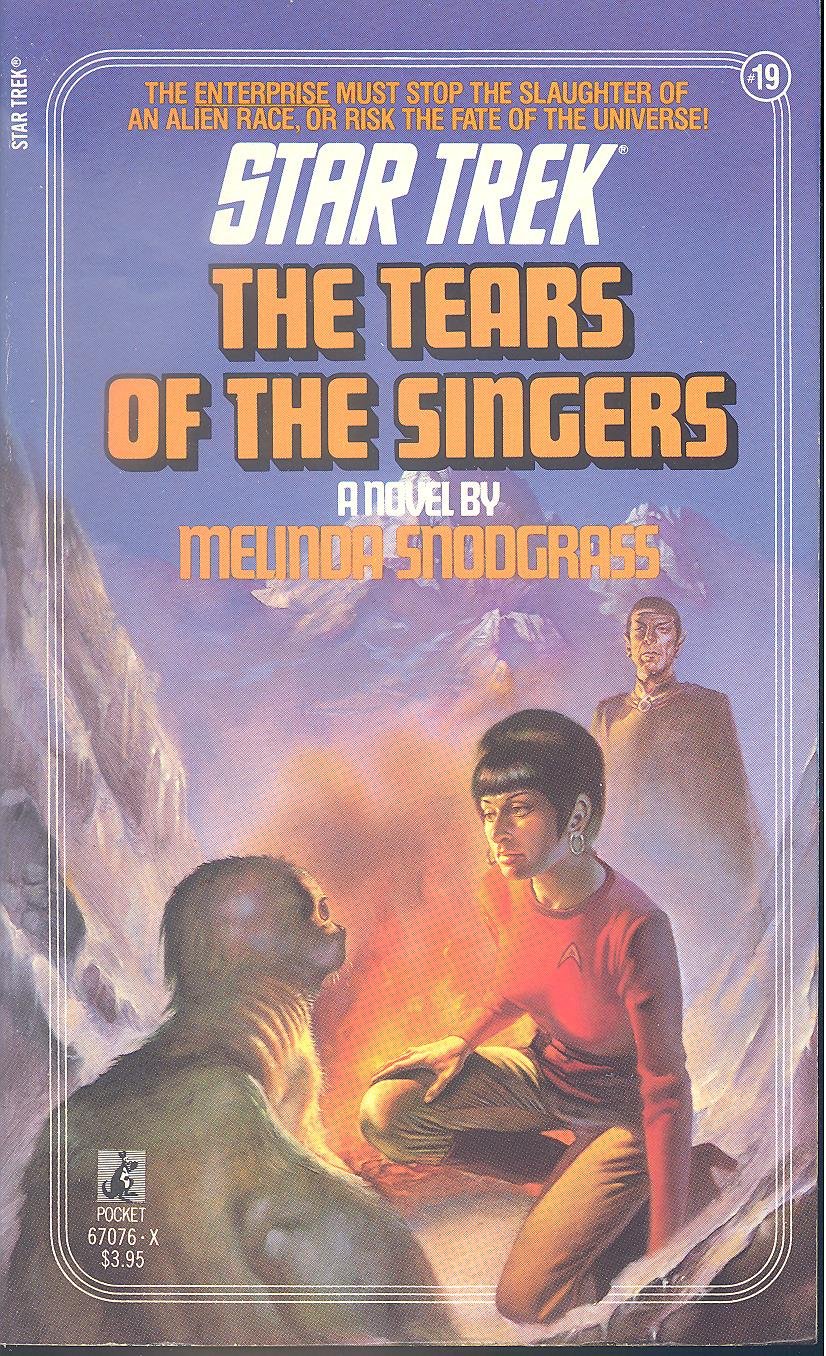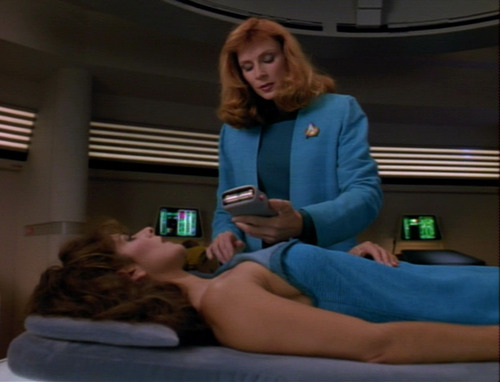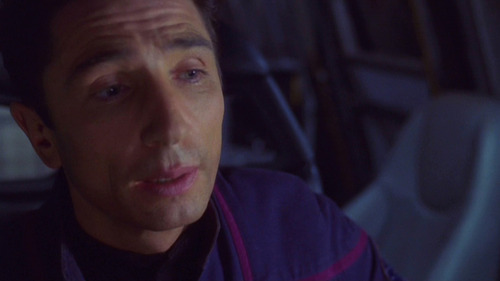Melinda Snodgrass wrote a Star Trek novel in which Uhura and her cranky, Beethoven-esque, musical genius boyfriend try to stop evil hunters from clubbing magical singing baby seals.
Don’t get me wrong; it’s actually pretty good as far as Star Trek books go, especially if you can keep reminding yourself that it was written in 1984, when a future full of super-advanced synthesizers and “Computer Tapes” seemed plausible.
The Plot
There’s a bonkers spatial anomaly that is basically eating the galaxy between Federation and Klingon territories. Spock figures out there is some kind of musical pattern to it but doesn’t have the musical skill to translate. Coincidentally they are on a starbase where there’s a musical genius, Guy Maslin, who is short, ugly, and as cranky as Beethoven but also as idolized as…Justin Bieber? One Direction? (what are the kids listening to these days?)
Kirk drafts him into Starfleet because he refuses to help, even though Maslin has a medical condition that means stress can kill him. Maslin holds proto-American Idol-style auditions (he is totally Simon Cowell) to get a crack team of musicians together. And he and Uhura fall in love over their shared appreciation for music.
They get to the anomaly and it turns out to be around a planet where these hunters have been killing these man-sized, singing, seal-like creatures, to harvest these crystals made out of their tears when they die. Everyone quickly figures out the aliens (the Taygetians) are sentient and also telepathic.
But the Klingons also arrive, commanded by Kor (who has a kick-ass new wife, Kali), who is facing a mutiny if he doesn’t attack the Enterprise. The rest of the book is about Maslin’s team trying to learn more about the Taygetians to piece together their song, stopping the hunters, and playing chicken with the Klingons.
Uhura Time!
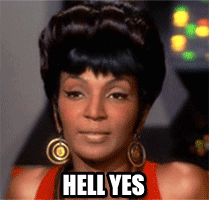
First, it is ALL the awesome to have an Uhura-centric novel, especially with the cover art that helps us envision her on an away mission in pants and kick-ass boots.
It’s cool to get to spend time with Uhura as she contemplates her role on the Enterprise and in Starfleet, and wonders whether she’s giving up more than she bargained for by not being able to really pursue long-term romance or a family.
I had mixed feelings about Uhura seeing Maslin. There are a great many times when he’s such a jerk that you can’t really fathom why she’s attracted to him, but Snodgrass clearly writes her as conflicted – slower to move from crush to love than he is.
And while she acts out of concern for him – at one point even going so far as to resign her commission over Kirk’s practically ordering Maslin to his death – she also stands up for her own interests in the relationship.
“You’re not fine and don’t curse at me. I’m not one of your groupies and I don’t have to take it.”
Late in the book she actually stuns Maslin with her phaser when he makes a stupid move and runs out into a place where he’d likely be killed.
Mostly, Kirk is decidedly a jerk about her relationship with Maslin, worrying about it getting in the way of her duty, although it’s totally cool for him to “spen[d] a moment admiring the way Lieutenant Bethany Wilson fitted her uniform.” And while that hypocrisy sucks, it’s pretty faithful to how things were on TOS. At one point, Snodgrass even highlights that!
Kirk made a face at his now-tepid coffee, and wondered if he was displaying a male bias. After all, he had had his share of romances during his time as captain of the Enterprise, and no one had ever questioned his efficiency.

And Uhura pushes back, from only a few pages in when they attend Maslin’s concert on the starbase.
Kirk leaned in and whispered, “Are you about to develop a crush, like ten thousand other women on a hundred other worlds?”
Uhura gave him a decidedly insubordinate look, and turned back to the stage.
The only thing is, it’s like Snodgrass thinks the audience is going to forget what Uhura looks like. She emphasizes her weight and her skin colour at practically every opportunity.
For example:
“I’m glad we caught you in.” Her slender body was swathed in a wrap of gold material which left one dark shoulder provocatively bare.”
“Maslin glanced nervously from the tensely alert security guards; to Kirk and Spock, gazing intently down the beach; to Scott, lovingly fingering his phaser; to Uhura, her beautiful dark face set in grim lines.”
“They were all staring at her now, their faces white and blank in the darkness. All but Uhura, whose skin was even darker than a Klingon’s.”
and
“Right,” the Bantu woman said with an amused glance at Kirk and Spock.
There’s clearly no derogatory intent, but because none of the white people’s skin colour is really mentioned, it shows Uhura still being treated as an exoticized other, even when she’s the focus of the book.
Snodgrass also overemphasizes the other people of colours’ races (except Sulu). Probably the worst is when she describes “Yeoman Chou, a diminutive Chinese girl who looked like she ought to be wearing a silk kimono rather than toting a phaser.”
So, um, kimonos are Japanese and that’s a horrible thing to say about a woman in Starfleet trying to do her job.
But I have to say the absolute most cringeworthy part of this book is when Uhura contemplates if being a woman commanding a ship is basically like being a lesbian:
The price of a starship was ceaseless devotion to work and career. She had seen it with Captain Kirk. However much he might yearn there was only one lady in his life and her name was Enterprise.
But do I want to become a lesbian? she thought rebelliously. Devoting my life to a mass of circuits and metal that by some ironic quirk of phraseology has been designated a she?
Um, Uhura? That’s not what being a lesbian is.
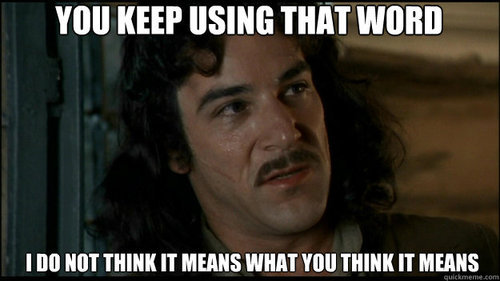
But thankfully, we still have…
Bad-Ass Klingon Ladies!
Well, lady, singular.
Despite her fragile beauty Kali was an intelligent, well-trained and highly capable female. In fact, she was one of the best sharpshooters in the Imperial fleet.
The Klingons in this book, pre-TNG, are apparently brutal to women. Their society reads a bit like the Terran Mirror Universe.
“I’ve read that a Klingon woman can only enter the service by marriage.” Yeoman Chou asked.”It that true?”
“Yes, as far as it goes. A woman cannot enter the service unless she has a male sponsor or protector. He may not necessarily be a husband.” Her lips twisted in a wry little smile. “We do not hold the favored position in society that you Earthwomen have.”
Kali is not happy with the system. Although she loves Kor deeply she is unwilling to submit to his first officer if he should successfully wrest control of the ship. She actually fights off two attempted rapes in this book, one from a hunter on the planet and one from the Klingon challenging her husband.
She also bands together with Uhura to challenge the men in command to act to stop the hunting.
“The women have known all along that the hunters were dangerous, and now that we have finally convinced you men, what are you going to do about it? If you are going to continue to dither and hesitate, and discuss the legality of this and the properness of that, then we women will act. Right, Uhura?”

Next on the List
I read a couple other reviews of this book before writing mine. One was Ellen Cheeseman-Meyer’s at Tor.com in which she mentions the book I clearly have to read next: Uhura’s Song by Janet Kagan:
Major features of this work include not one, but TWO planets of cat-people, the revelation that the Federation Diplomatic Corps is no good at holding on to personnel, an epic coming-of-age journey, lots and lots of ballads (Kagan does not transcribe the dirty ones) and a seemingly infinite supply of Mary Sues for women and cat-lovers of all ages.
Uhura and cat people? I am so there.







